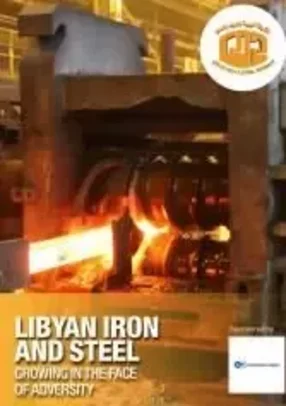Libyan Iron and Steel Company (LISCO), is working against the odds to help rebuild the country’s economy after the 2011 revolution and is doing so with a carefully considered strategy to expand its 60 percent iron and steel market share in Libya.
The company, headed by its Chairman Dr Mohamed Elfighi, is facing the greatest challenge of its existence, yet at the same time it is pushing forward with an ambitious output expansion backed up by maintaining globally recognised standards.
Operations
LISCO is one of the largest industrial companies in North Africa and produces a range of iron and steel products. It is owned by the Libyan Government and employs roughly 6,800 people across its facilities; liquid steel production stands at 1.5 million tonnes per year and its annual revenues stand at approximately one billion Libyan Dinars.
Elfighi was frank about how stability issues had slowed the company’s operations but these had not prevented the company from looking to the future and in fact had proven to be a source of innovative thinking.
He said: “Before the revolution we invested roughly one billion Libyan Dinars on a large expansion to increase annual steel production to 4 million tonnes per year. Some plants have already been finished and some are ready for commissioning but because of the situation in Libya contractors have the sites. Now we are in negotiation with Danieli to get remote assistance for delivering a new bar mill.”
Iron Plant
LISCO’s Direct Reduced Iron (DRI) plant is comprised of three production units; two of which have a potential annual output of 1.1 million tonnes while the third has capacity for 650,000 tons per year of hot briquetted iron (HBI).
DRI is produced by reducing various forms of iron ore billets into iron using locally available natural gas; HBI refers to a compacted version of this product, which is easy to transport and handle.
Steel Plants
The company’s steel production is spread across two separate facilities, which allows it to produce several different steel products. Its billets and blooms plant has an annual designed production capacity of 670,000 tonnes of liquid steel which converts to 630,000 tonnes; this was expanded in 2008 to produce one million tonnes. The plant uses three electrical arc furnaces which each have a capacity of 90 tonnes.
Complementing this facility is LISCO’s steel slab plant which has an equal number of 90-ton arc furnaces providing a designed annual output of 650,000 tonnes of liquid steel that converts to 611,000 tonnes per year of slabs.
Competitive Position
Operating in the eastern part of the country is extremely difficult due to security concerns, but a new threat has arisen since 2011 in the form of competition from Abroad. Elfighi said: “The Libyan market is now open to imports from China, Ukraine, and Turkey; from everywhere.”
Building up LISCO into a recognisable brand has proven to be a timely solution to this new problem, Elfighi said: “We are concentrating on the value and quality of our products, as well as improving costs and the delivery times. LISCO is well known for being number one for quality in Libya.” Achieving recognition has also been approached laterally, through obtaining various assurances for good governance which include ISO 14001, 9000 and 18000 accreditations.
Paying attention to its brand, LISCO is now exporting all its products worldwide, especially to Southern Europe, China, Turkey, and to many Arabic nations.
Since 1998 LISCO has also been working towards a more diverse product base and has achieved this goal quite substantially. Forming a single plant, its galvanised coils section produces 80,000 tonnes annually, while its painted coils line stands at 40,000 tonnes.
The company has an additional four mills which enable it to value-add to its steel products. Its bar and rod mill consist of two lines each producing 400,000 tonnes annually. It also produces light and medium sections of varying sizes and dimensions through a dedicated mill with an annual capacity of 120,000 tonnes. Furthermore, its hot rolled coil production stands at 580,000 tonnes in its respective plant, while cold coil plant production has an annual capacity of 140,000 tonnes.
The path chosen by LISCO has certainly not been the easiest one, which perhaps goes to show why the company is performing so well despite far from ideal conditions. It is expanding in the face of encroaching imports from around the world and is doing so while some areas of the country are still unstable. As the country begins to invest in infrastructure again, the company will be perfectly positioned to grow with Libya.

